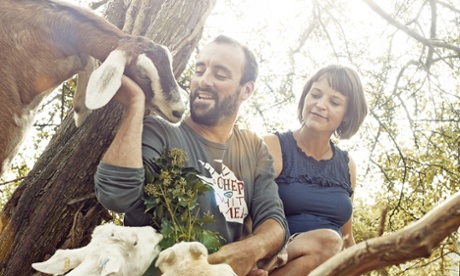
James Whetlor and Sushila Moles didn’t set out to create an award-winning business; they just wanted a bit of help with the garden. Four years ago, they moved into a two-bed cottage in an idyllic corner of Devonand took on with a patch of land that hadn’t been touched in years; it was less green and pleasant than impenetrable and daunting. “We’d planned for a couple of pigs,” Moles says, “but the neighbours wouldn’t agree, so we got four goats instead. The idea was they’d clear the ground in return for being looked after.”
At the time, both worked at River Cottage, Moles as events manager, Whetlor as chef at River Cottage Canteen in Axminster. One day he popped over to see his bread supplier at Taunton farmers’ market and, being a novice goat-keeper, went to check out the goat’s cheese stall next door. It belonged to Will Atkinson of Hill Farm, “and I ended up buying a couple of goats off Will to put on the Canteen menu. They flew out of the door. I thought, ‘We’re on to something here’, and went straight back to Will for more.”
Atkinson, meanwhile, was in a moral dilemma: he’d ditched corporate law to become a cheesemaker, and had recently come to the dreadful realisation that the billy kids born into his herd were surplus to requirements (boy goats don’t produce milk, after all). He’d asked other dairies for advice, and learned it was standard practice simply to kill them at birth; Defra say around 90,000 billies born into the UK dairy industry suffer a similar fate each year. Britain doesn’t have much of a goat-eating culture, but it’s a different story elsewhere: globally, it’s a major protein source, not least because goats are far easier to raise than sheep. The meat is lower in fat and cholesterol than beef, pork and lamb, and high in iron and protein, too. “Will and I decided to try to make use of a resource on our doorstep that was just going to waste,” Whetlor says.
Cabrito Goat Meat was born. Whetlor began buying Atkinson’s surplus billies to rear for their meat, and used his contacts on the London restaurant scene to find a market: before moving to Devon, he’d spent 15 years cooking at some of the capital’s top restaurants. “We sold our first kid to Jeremy Lee at Quo Vadis in March 2012.”
Four months later, Whetlor quit River Cottage to take over the kitchens at the Volunteer Inn in Lyme Regis, but he and Moles already had their sights set on an alternative way to make their living. For the next year, Whetlor spent much of his spare time driving kids up and down the A303 in a clapped-out van with moss growing on its engine, often setting off for London at dawn so he’d be back at the Volunteer in time for lunch service.
But Atkinson’s herd had only 60-70 nannies, so could provide only 30-odd billies a year, or enough for a not-very-lucrative cottage industry. . “We thought we’d maybe make enough to pay for a holiday,” Moles says. But then they met Will Frost at Childhay Manor Farm and everything changed: an organic, free-range meat farmer in Dorset, Frost also keeps 2,000 milking nannies, and he let Cabrito take the unwanted billy kids off his hands. That gave the couple 1,000 extra kids a year.
The likes of St John, Sat Bains and the Ledbury began buying Cabrito’s kids. “The fact that such venerated restaurants use our product is a massive help,” Whetlor says. “Plus, my kitchen background means I can talk to chefs not as a salesman, but in their terms: the different cuts, what to braise, what to roast, that kind of thing.”
And it’s not just fancy restaurants, either: sSupermarkets and other food outlets are also showing an interest in goat, and last month they began supplying Gourmet Goat in the goldmine that is Borough Market. Moles is currently in advanced talks with some of the south-west’s bigger dairies to take on their billies, too, so Cabrito can keep up with growing demand. As if all that isn’t quite enough to be going on with, the couple’s first child is due to make an appearance two days after the OFM awards ceremony.
Even so, Whetlor still spends much of his week driving 1,000-plus miles, though he has finally bought a decent van. “We have no choice but to do it this way, because we don’t have the capacity to store carcasses,” he says. “The plus side is, we didn’t need a big initial investment for premises, staff, meat-handling certificates; it simplifies the way we operate.” The model of producers selling directly to customers is one we’re seeing more of. “Chefs these days want to go straight to the source, rather than via a middle man.”
Moles, however, has another theory for their success: “Only a cook would be dumb enough or mad enough to drive around all week in a van full of dead goats.”
- Cabrito supports the charity Kids For Kids, which works in Darfur, Sudan, by lending goats to families, providing regular milk for the children while the goat kids form the nucleus of a new flock.

